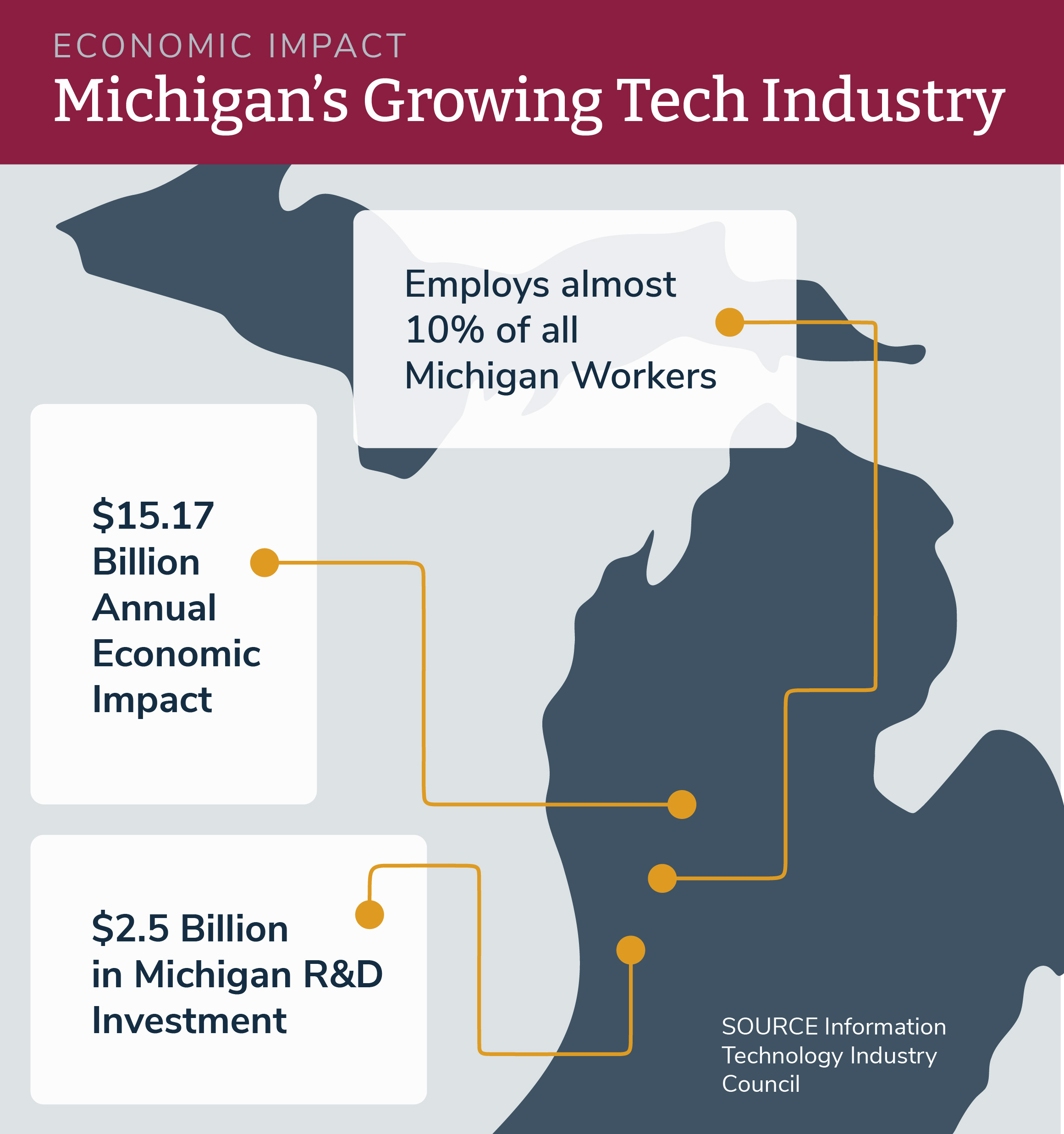If you were in an airport on July 19 or December 15, 2024, you witnessed the chaotic impact of computer system failure. In each incident, more than 7500 flights were cancelled, stranding thousands of travelers, and costing the industry an estimated $10 billion. These events are ominous examples of the potential fragility of the tech infrastructure that powers the modern world. The specialized buildings that house the tech industry’s people, data, and software play an important role in supporting flawless day-to-day operations and offering protection against devastating system failures.
 All the tech biggies like Google and Amazon, plus lesser-known firms like Grand Rapids-based Service Express and Blue Medora collectively contribute more than $2 trillion or 10% of GDP to the US economy. They employ 8.9 million workers directly and influence the employment of 5 times as many workers in tech support sectors. All this computing requires complex, expansion-ready tech infrastructure plans.
In Michigan, the already booming tech industry is poised for continued growth, which will require specialized buildings and intentional infrastructure investments.
Source: Information Technology Industry Council
All the tech biggies like Google and Amazon, plus lesser-known firms like Grand Rapids-based Service Express and Blue Medora collectively contribute more than $2 trillion or 10% of GDP to the US economy. They employ 8.9 million workers directly and influence the employment of 5 times as many workers in tech support sectors. All this computing requires complex, expansion-ready tech infrastructure plans.
In Michigan, the already booming tech industry is poised for continued growth, which will require specialized buildings and intentional infrastructure investments.
Source: Information Technology Industry Council
Sources: Precedence Research, marketsandmarkets.com
Keep these pre-construction considerations in mind to help your property keep up with future demands:
 A high-functioning workplace that gives tech employees the office space they need to thrive starts with ergonomic workstations, lighting that adapts to the needs of highly focused tasks like software engineering, and comfortable and inviting collaboration areas. In a highly competitive tech environment, the workplace plays a key role in attracting and retaining valuable team members. Spaces designed to display the employer’s brand, core purpose, and values are motivating and build brand loyalty among both employees and client guests. Amenities like well-appointed café spaces and fitness facilities proactively support team building efforts as well as worker health and well-being.
A high-functioning workplace that gives tech employees the office space they need to thrive starts with ergonomic workstations, lighting that adapts to the needs of highly focused tasks like software engineering, and comfortable and inviting collaboration areas. In a highly competitive tech environment, the workplace plays a key role in attracting and retaining valuable team members. Spaces designed to display the employer’s brand, core purpose, and values are motivating and build brand loyalty among both employees and client guests. Amenities like well-appointed café spaces and fitness facilities proactively support team building efforts as well as worker health and well-being.
In the US and in Michigan, tech is huge. And growing.
 All the tech biggies like Google and Amazon, plus lesser-known firms like Grand Rapids-based Service Express and Blue Medora collectively contribute more than $2 trillion or 10% of GDP to the US economy. They employ 8.9 million workers directly and influence the employment of 5 times as many workers in tech support sectors. All this computing requires complex, expansion-ready tech infrastructure plans.
In Michigan, the already booming tech industry is poised for continued growth, which will require specialized buildings and intentional infrastructure investments.
Source: Information Technology Industry Council
All the tech biggies like Google and Amazon, plus lesser-known firms like Grand Rapids-based Service Express and Blue Medora collectively contribute more than $2 trillion or 10% of GDP to the US economy. They employ 8.9 million workers directly and influence the employment of 5 times as many workers in tech support sectors. All this computing requires complex, expansion-ready tech infrastructure plans.
In Michigan, the already booming tech industry is poised for continued growth, which will require specialized buildings and intentional infrastructure investments.
Source: Information Technology Industry Council
Unique Tech Construction Specifications
Data centers and similar buildings that house highly valuable virtual “products” and the people who create and manage them share unique functional criteria. Consider these specifications that directly impact tech sector new construction and expansion projects.Tech Industry Security
To protect highly sensitive data, software, and hardware from theft and physical damage, a typical data center requires security systems reminiscent of a James Bond movie scene:- 8–12-foot fencing, bollards, and vehicle barriers around the perimeter of the building
- Reinforced concrete walls for physical protection and blast resistance
- Airlocks, mantraps, and biometric access controls
- 24/7 video surveillance with high-definition cameras and long-term data retention
Connectivity Considerations
Tech operations require highly reliable and often complex digital networks. Structured cabling systems must support network redundancy, multiple internet service providers (ISPs), and scalable, high bandwidth connections.Future Proofing
The growing use of artificial intelligence (AI) and internet of things (IoT) technology is partly responsible for the rapidly expanding tech economy. Projected compound annual growth rates of 30-37% for AI and 19% for IoT point to a future where tech is ubiquitous across many areas of life.Sources: Precedence Research, marketsandmarkets.com
Keep these pre-construction considerations in mind to help your property keep up with future demands:
- Master space planning that assumes future growth and anticipates how a site will need to adapt is critical.
- Geographic locations that provide expansion options provide many strategic advantages.
- Modular construction approaches can speed up the design and building phases of expansion projects.
- For data center building or expansion projects, sharing your Uptime Institute Tier Classification goals with your contractor will serve to sync project planning with your short and long-term needs.
Design Requirements
Specialized features are must haves in spaces where tech-driven functions are housed. These can include:- Server rooms with 12–14-foot ceiling heights
- Raised floor load capacity of 150-500 pounds per square foot
- Reinforced, thermally insulated, and fire-resistant materials
- Roofs designed to support cooling equipment or solar panels
- 24/7 surveillance systems integrated throughout the building
- Well-appointed office and collaboration spaces

Built to Function 24/7/365
The burden of managing systems that cannot fail requires highly efficient operational control. And the burden of constructing a space that performs flawlessly falls to the general contractor. Veneklasen Construction’s VP of Project Management and Pre-construction, Doug Ritz, summarizes how his team approaches this responsibility, “Understanding in detail how a building will be used, listening carefully to a client’s needs, and empowering our team to deliver highest quality outcomes allows us to plan and build with confidence.” Performing to highest standards in 4 functional areas can protect systems from going offline:Power Needs
Central to a well functional tech operation is adequate and reliable power. US data centers consumed 4.4% of the country’s electricity in 2023. The US Department of Energy predicts this to nearly triple by 2028. Energy efficiency and access to sustainable energy options are therefore paramount, and standard energy output isn’t enough. High-density power supplies – up to 800 watts per square foot – are required in many operations.Highly Specialized Heating and Cooling
HVAC systems with sophisticated environmental controls are needed to maintain strict temperature and humidity tolerances in server rooms. This is accomplished with 12–36-inch raised floors that accommodate sophisticated heating and cooling, airflow, and cabling systems under highly stable flooring that can hold the weight of high-value equipment. It’s important to work with HVAC sub-contractors who have received specialized training to work in this unique environment.System Redundancy
In an environment where customers do not tolerate downtime, backup systems can provide seamless performance in the event of power or networking disruptions. To maintain connectivity, plan for a minimum of two diverse fiber entry points with multiple ISPs. To maintain operations in a power outage, Uninterruptible Power Supply (UPS) systems and diesel generators capable of supporting entire facilities for 24-48 hours without refueling are standard.Disaster Planning
Resilience planning maps out data storage and recovery processes that prevent system failures and instruct recovery steps when failures do occur. In some geographic areas, natural threats such as earthquakes and wildfire must be mitigated with specialized engineering and construction features. These risks aren’t a concern in Michigan – one of many factors making the region an attractive place to build tech infrastructure.Office Spaces to Support Tech Industry Workers
 A high-functioning workplace that gives tech employees the office space they need to thrive starts with ergonomic workstations, lighting that adapts to the needs of highly focused tasks like software engineering, and comfortable and inviting collaboration areas. In a highly competitive tech environment, the workplace plays a key role in attracting and retaining valuable team members. Spaces designed to display the employer’s brand, core purpose, and values are motivating and build brand loyalty among both employees and client guests. Amenities like well-appointed café spaces and fitness facilities proactively support team building efforts as well as worker health and well-being.
A high-functioning workplace that gives tech employees the office space they need to thrive starts with ergonomic workstations, lighting that adapts to the needs of highly focused tasks like software engineering, and comfortable and inviting collaboration areas. In a highly competitive tech environment, the workplace plays a key role in attracting and retaining valuable team members. Spaces designed to display the employer’s brand, core purpose, and values are motivating and build brand loyalty among both employees and client guests. Amenities like well-appointed café spaces and fitness facilities proactively support team building efforts as well as worker health and well-being.
West Michigan Says Welcome Home to Tech Companies
Grand Rapids, and the entire West Michigan region has become an inviting home for both tech startups and established tech companies. Top universities contribute to a strong talent pool and the combination of a relatively low cost of living and high quality of life invites skilled workers to settle in the region. Economic incentives encourage and support ongoing investment in Michigan-based innovation. Veneklasen Construction is proud of our role in supporting the growth of many West Michigan companies. Our own use of technology combined with innovative project and people management and proven building practices make us an accomplished partner for your commercial or tech building project.
